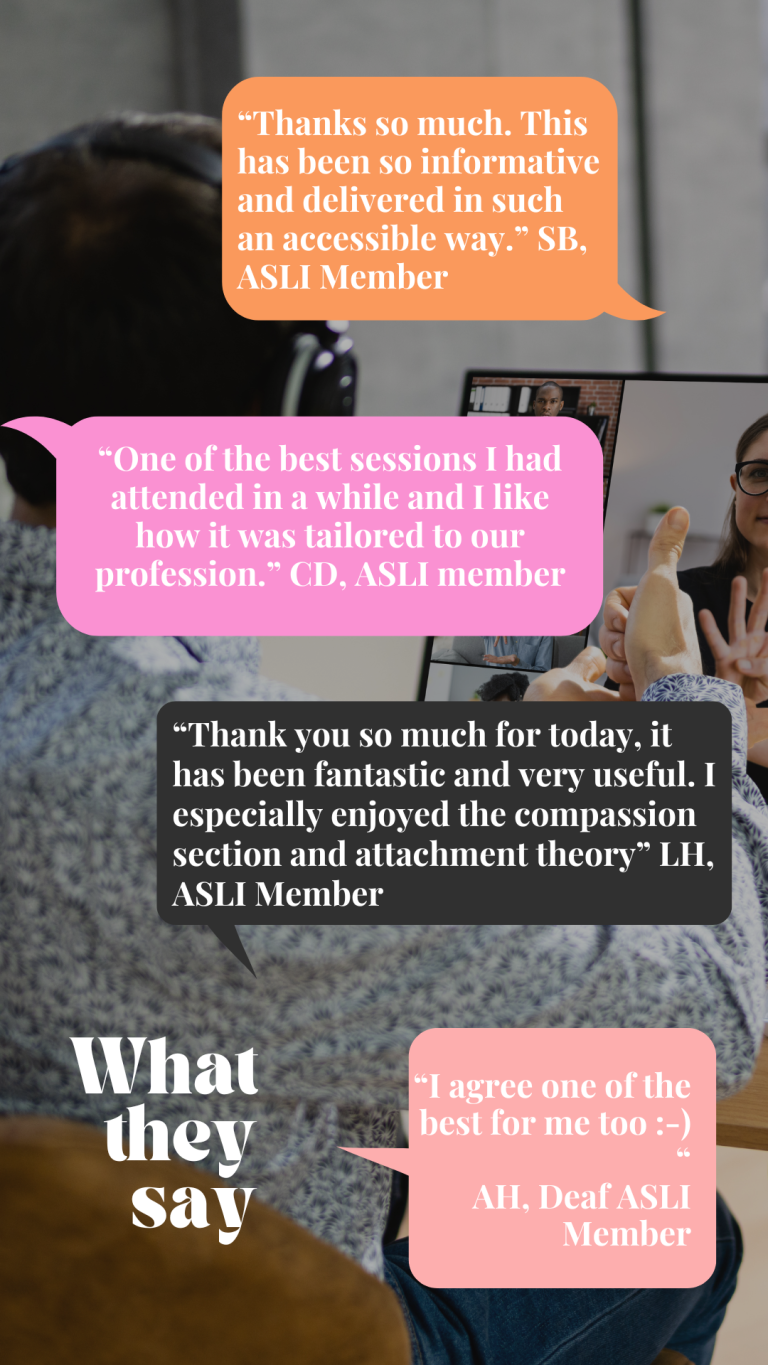NEW CONTENT:
Bespoke Training for the Association of Sign Language Interpreters (ASLI)
2025 was the start of an amazing new year for us which began with the development and delivery of a bespoke trauma-informed training product with and for members of the Association of Sign Language Interpreters (ASLI). Recognising and gaining a growing appreciation and understanding that Deafness is not just a medical condition, but also a cultural identity with its own language (Sign Language), traditions, and values has made the whole experience has been incredibly satisfying for 3 key reasons.

Firstly, it has been rewarding to collaborate with ASLI members who are passionate about their work and dedicated to providing the best possible service to the Deaf community. Through a comprehensive stakeholder event, their insights and experiences have been invaluable in shaping the training product to ensure it is relevant and effective.
Secondly, it has been fulfilling to create a product that will make a real difference in the lives of both interpreters and the individuals they work with and support. By raising awareness of trauma and its impact, and by equipping interpreters with the skills and knowledge to work in a trauma-informed way, we can create a safer and more supportive environment for everyone.
Finally, it has been a privilege to be part of a project that is at the forefront of promoting trauma-informed practices within the interpreting profession. This is an important step towards ensuring that interpreters are equipped to handle the unique challenges of their work, and that the Deaf community receives the highest quality of service.
Cornwall Adult Social Care Embraces Trauma-Informed Training
May 2024
** Estimated Reading Time ** 2 minutes

What's the story
Shifting the lens
We have recently returned from delivering our 4th bespoke CPD accredited trauma-informed training session for adult social care staff in Cornwall. We are so pleased that the training has been met with overwhelming enthusiasm. Designed to equip a cross section of adult social care professionals with the knowledge and skills to better support individuals impacted by trauma , the training also encourages professionals to take care of themselves too, recognising that self care is not self indulgent.
Feedback from participants revealed a high level of satisfaction with the training content and delivery with professionals reporting feeling more confident in identifying signs of trauma and utilizing trauma-informed practices in their interactions.
Many participants commented on the fresh perspective gained through the training. Understanding the potential impact of trauma on behaviour allows for more compassionate and effective care ad professional practice.
Next steps
What people said..
The positive response to the training sessions delivered so far demonstrates a strong commitment to trauma-informed practice within Cornwall's adult social care sector. This initiative paves the way for improved service delivery and empowers professionals to better meet the needs of those they serve.
We are looking forward to delivering the next phrase of the training in November.
"Really interesting training and trainers very knowledgeable and engaging. Good mix of slides, videos and group work."
What's new?
The field of trauma-informed care is dynamic, with ongoing advancements and refinements. Staying current allows practitioners and organisations to continually improve their strategies and interventions based on emerging knowledge.
Stay informed with our "What's New?" section.
How can we make prison spaces more child-friendly for children visiting a parent?
Click on the image to read this brand new report from the Children of Prisoners, Europe. Through meaningful consultation with children affected by parental imprisonment across 10 European countries, the report identifies key issues and makes practical recommendations around how prison spaces can become more child-friendly for children visiting a parent.
Published June 2024.
Adverse childhood experiences among children of parents who are refugees affected by trauma in Denmark: a register-based cohort study.
Click on the image to read the study conducted by Bager and colleagues, as published in The Lancet Public Health in 2022. The research highlights that children of refugee parents who have experienced trauma are more likely to be exposed to adverse childhood experiences (ACEs) and to accumulate these experiences over time.
Additionally, the study indicates that children of parents who migrated from a refugee-sending country also face increased risks of adversity. It is worth noting that the authors highlighted that this group of individuals may benefit from policy interventions.
Published on on September 14, 2022.
Trauma-Informed Practice: Learning from Experience of Violence Reduction Unit delivery 2021-2023
Click on the image to see the latest learning and practice from the experience VRUs, including information on:
- what trauma-informed training and practice is
- considerations when designing and implementing
- case studies
- useful resources and information
Published on 30th January 2024.
Doing Trauma-Informed Work in a Trauma-Informed Way: Understanding Difficulties and Finding Solutions
Click on the image to see the article by Natalie Edelman et al about the challenges and hurdles of doing trauma informed work in a trauma informed way.
First published online on 29th November 2023.
The ‘Sequential Intercept Model’ – a trauma-informed diversionary framework
This report highlights how the ‘Sequential Impact Model’ (SIM) can be used as a trauma-informed framework which identifies key stages and opportunities for diverting children and adults with complex needs from the criminal justice system or from penetrating deeper into the system.
Published on 25th January 2024.
The Metropolitan Police Service’s handling of the sexual and criminal exploitation of children
Read the report from the HMICFRS following their investigation into what the Metropolitan Police Service does in its efforts to establish the true nature and scale of child exploitation in London including:
- governance arrangements
- numbers of officers and staff allocated to child exploitation work
- internal systems and processes
- information-sharing arrangements and work with other public services
- the quality of its intelligence and investigations
- the internal culture and
- how it treats the children it comes into contact with
Published on 9th February 2024.

Compassion Unleashed: The Game-Changer in Trauma-Informed Transformation
**Estimated Reading Time:** 4-5 minutes
In the constantly changing professional world, there is a noticeable movement towards adopting a trauma-informed approach.
Leaders, employees, and service users are beginning to understand and acknowledge the valuable advantages of integrating compassion into their interaction.
This article explores the impactful role of compassion in the context of the trauma-informed journey for service users, leaders, and employees.
A trauma-informed approach involves acknowledging the broad impact of trauma on individuals and adopting an approach that prioritise safety, trust, and empowerment. By infusing compassion into this, we can establish an atmosphere that promotes healing and resilience.
Benefits for leaders:
Compassionate leadership is fundamental to the successful transition for organisations to become trauma-informed. This includes the development and implementation of trauma informed strategies.
Leaders who recognise the importance of compassion foster a supportive culture where employees feel recognised, appreciated, valued and valuable.
This not only boosts employee well-being but also elevates morale and productivity. In short, its good for business.
Benefits for employees:
Compassionate support from leaders cultivates a sense of security and validation among employees.
This nurturing environment encourages personal and professional development, growth and confidence leading to increased job satisfaction and a positive, more harmonious workplace environment.
Benefits for service users:
Service users of a trauma-informed service benefit from compassionate interactions tailored to their unique, individual needs.
Understanding the effects of trauma allows, enables and empowers staff to adjust services sensitively, fostering trust and developing meaningful, engaging, enduring professional relationships.
Compassion is the essential component when becoming trauma-informed, regardless of which lens you are looking through.
When we understand the intrinsic and powerful benefit of compassion, we can develop a workplace environment, culture and service that values well-being and leads to positive transformations for each individual it touches.

Navigating the Tension:
The demand for efficient service delivery often dances in tandem with the profound shift towards trauma-informed practices. Walking this fine line involves careful consideration as every choice affects those we support. Achieving the right balance necessitates a deep understanding of the urgency of immediate needs and the enduring benefits of trauma-informed care.
Operational Synergy:
To achieve harmony, integrating trauma-informed principles smoothly into operational procedures is essential. It's not only about the end result but also about the approach. Developing protocols that focus on safety, trust, and empowerment guarantees that service provision supports and promotes healing, wellbeing and resilience rather than just being a transaction.
Staff Empowerment:
Empowerment starts within. Fostering a trauma-informed culture among staff is integral to successful integration. Training and support mechanisms that equip team members with the skills to navigate this delicate balance become the foundation for delivering services that are not only efficient but also deeply compassionate.
Harmony in Action: Balancing Service Delivery with Wholehearted Trauma-Informed Commitment
**Estimated Reading Time:**
3-4 minutes
Innovation Focused on Individuals:
The need to balance service provision with a commitment to trauma-informed care can be the catalyst for innovation. It involves envisioning new solutions that address immediate requirements while integrating long-term healing. Approaches which engage service users in designing and assessing programs, establish an intricate blend of practicality and compassion. This collaborative effort allows service users to feel involved and appreciated in an ongoing transformation towards improvement. As a result, it cultivates an environment where trauma survivors can become more empowered and enhance their resilience.
The Ripple Effect:
When service delivery is in harmony with a trauma-informed approach, the influence is profound, enduring and far reaching. It goes beyond mere transactions and it creates the perfect environment to develop and nurture significant, meaningful connections. Both service users and staff feel acknowledged, understood, and appreciated, operating an environment of trust, safety, and authenticity that goes beyond the initial service interaction.
Explore our 'What We Offer' page to see the wide array of services we offer. Learn how we can support you on your journey towards trauma-informed care.
The Challenge:
In the dynamic and relentless landscape of service delivery, finding equilibrium between meeting immediate needs and fully committing to a trauma-informed approach is a delicate yet transformative pursuit. This blog explores the art of balancing these demands, illuminating the path towards harmonising service excellence with a genuine commitment to trauma-informed care.
©Copyright. All rights reserved.
We need your consent to load the translations
We use a third-party service to translate the website content that may collect data about your activity. Please review the details in the privacy policy and accept the service to view the translations.






